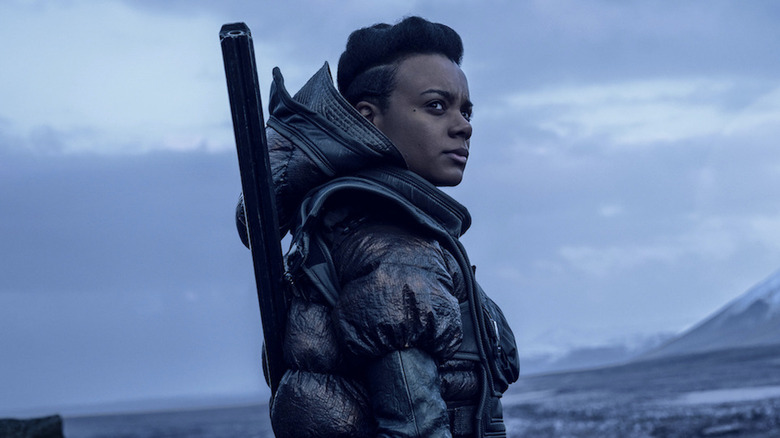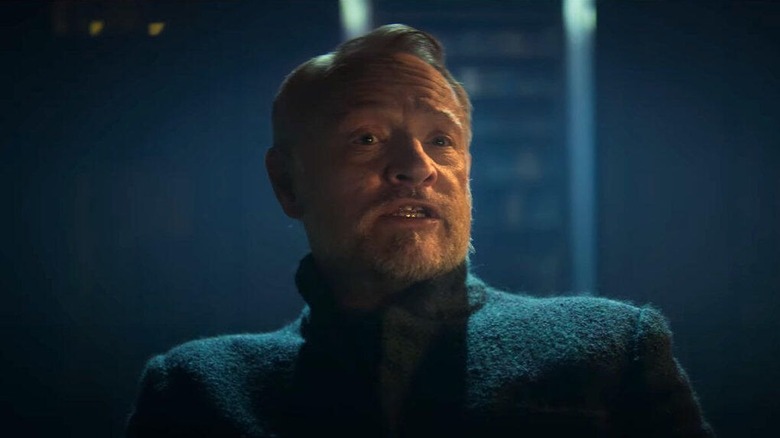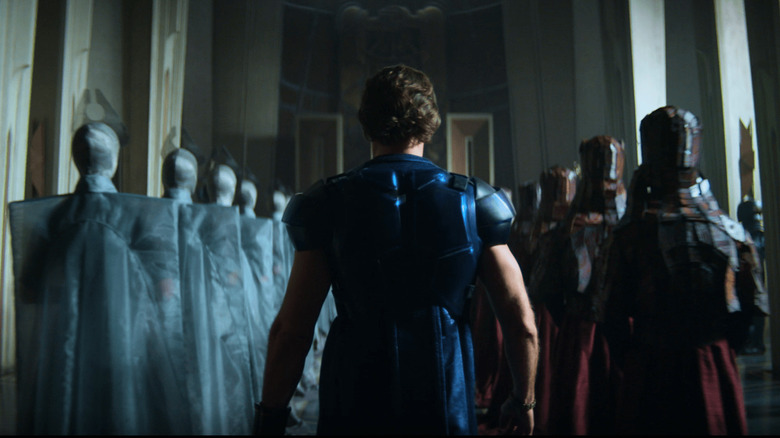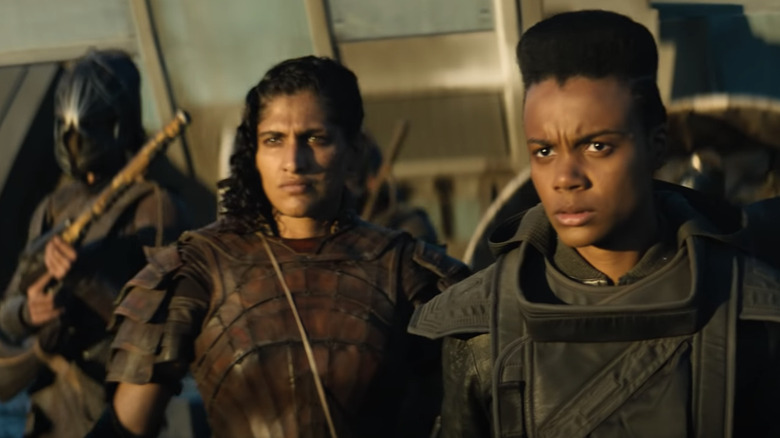Foundation Was Considered Impossible To Adapt – Here's How David S. Goyer Did It [Interview]
How the hell do you make a TV series out of "Foundation"?
Isaac Asimov's influential science fiction novel series is highly regarded, but they're not cinematic. Sure, the story is about the impending collapse of a galactic civilization and the people who set out to save society, but there's not much action. There's no romance. There aren't even consistent main characters, as the stories span centuries and people sometimes die off between chapters. They're mostly long conversations between characters discussing the past and the future, often alluding to grand events we never actually see take place. The books are often brilliant, thoughtful pieces of imagination from a legendary writer. But they're anti-cinema.
Enter showrunner David S. Goyer, who received the blessing from the Asimov estate to radically remix "Foundation" and transform it into a lavish new streaming series for Apple TV+. Looking to shows like Game of Thrones for inspiration, Goyer and his writers reworked Asimov's universe not only for television but for a modern audience. The almost entirely male cast of the books has been largely gender-swapped, with women and non-binary performers playing key roles. People of color fill out large swaths of the ensemble. Sequences of heady science fiction are now accompanied by slick, brutal action scenes. And yes, people flirt and kiss and have sex.
Some Asimov scholars may protest, but Goyer knows he's not making an extremely expensive Apple TV+ show for Asimov readers. He's making it for everyone. "I can also credit my own wife for that, who's not a science fiction fan," he told me during a recent interview when I asked about the inclusion of romance into Asimov's largely sex-free world. "And she would constantly say, 'It's got to be emotional. It's got to be sexy. We have to care about these characters.'"
During our interview, Goyer told me all about how the series reinvents "Foundation," and why they made those choices. We also spoke about Asimov's shared science fiction universe, the grand plan for the entire series, and how time plays a crucial role in this season and beyond.
"We agree with you. And even Asimov did before he died. He agreed with you."
I made the deliberate choice to not revisit the "Foundation" books before watching the show. I wanted to go in fresh. But my memory from reading them in high school is that they are fascinating, but there was a lot of people sitting in rooms, talking about things that happened or will happen.
And smoking space tobacco.
At what point did you find the way into this? Because it's a terrific book, but nothing about it screams TV show or movie.
A couple times in my career I'd been offered the opportunity to adapt it as a feature or series of features. And both times I'd turned it down because I didn't think that it could be realized in three hours, or even potentially nine hours. I won't lie. Watching the success of "Game of Thrones" and immersing myself, like a lot of the audience, with something like that, a work that's so sprawling, I think the advent of that show or shows like "Breaking Bad," or even "Better Call Saul." I mean, the idea of watching something unfold in a novelistic way over the course of 50, 60, 70 episodes, that it seemed like the medium had caught up to the book.
I only had 24 hours to decide whether or not I was going to throw my hat in the ring. And so I thought, "Okay, I've got to deal with these big time jumps. I've got to deal with the fact that a lot of important things happen off-screen." But for me, the big thing was the books aren't particularly emotional. They're books about ideas. And so I thought, "Is there a way to create characters that can emotionally embody the themes that Asimov is talking about? If we can do that, then maybe there's a way to tell the story." And so, I told the Asimov estate and Robin Asimov, that I didn't think it was possible to do just a straight line for line adaptation. Fortunately, they said, "We agree with you. And even Asimov did before he died. He agreed with you."
I said, "I know Asimov was initially writing the trilogy in a post-World War Two environment. That's not the world that we live in today." So I felt that for the metaphors, we needed to be interrogating what was happening today, and I felt that the audience needed to reflect the world of today. There are almost no female characters in the first book. There's one that has a few speaking lines. So I said to Asimov estate, "How do you feel if I gender-flipped a few of the characters?" And they said, "Great, we think you should." So it was trying to find ways in emotionally, and that's what led me to the invention of the genetic dynasty. So the Empire's resistant to change. How can I come up with a character or series of characters that can embody that?
And I thought, "Well, the purest embodiment of being resistant to change is a single individual, just cloning themselves over and over and over again, this just immense act of hubris and ego." And I thought, "Oh, that's a cool way to do that." And the same time, it allows the audience to have the same face that they can attach to the empire from episode to episode, or perhaps from season to season.
I don't know how many episodes you've seen, but then that led to, I think, some really interesting emotional stories to tell about the emperors themselves. Because even though they're resistant to change, they're all living in the shadow of Cleon the First. And they're all desperate to put their own individual mark on the world and mark on the galaxy, and they're all doomed to fail. And that was really interesting as well. That was the starting point.
Another starting point, Gaal Dornick is the point of view character in the first story. And I thought, "I'm going to extrapolate from that and make Gaal Dornick the point of view character for the first season." And what's nice about that is Gaal's never been off her home planet. She's never made a jump through space. She hasn't really been introduced that much to psycho-history, so she can be the audience's eyes and ears, and she can be their guide into this world and all these crazy concepts.
"I'm not interested in traditional black and white stories."
The third episode has an extended sequence where the oldest clone of the triumvirate of emperors is getting ready to pass away, and a new clone will be born. It is utterly unlike Asimov's writing but somehow feels at one with his work. You're not adapting Asimov as much as you're finding what was unsaid in his work.
Yeah. I'm glad you said that because episode three is one of my favorite episodes, and it by design was meant to be a very different kind of episode. And I think so far, at least in terms of the feedback I'm getting from people, they were very surprised by where we go in episode three. But in a way, I think episode three is very emblematic of our version of what "Foundation" is because it's taking these themes and figuring out all these surprising and emotional ins and out.
I'm not interested in traditional black and white stories. I like shades of gray, and I challenge our audience and also our writers to come up with ways to sympathize and empathize with emperors, who on the face of it, seem like monsters. And I think we call the beginning of that episode, The Short Film, and there will be more of them in this series. And I love the opportunity. That's something that we're not really condensing Asimov's "Foundation" with this show. We're actually expanding it, and that's luxury. And I love being able to do those kind of tone poems. And most of the people that see episode three are very moved and surprisingly moved by what happens by Dusk, with Dusk in that storyline. And that's what we were going for.
That's where I was really won over. I was watching with my wife, who's never read Asimov–
Great. Your wife is our audience.
She is. After episode two, which has a romantic relationship between Gaal and Rasche, I told her that Asimov was a great writer, he didn't write sex. He didn't write romance. And she said, "Well, 'Foundation' is a sexy show. I'm into this." You've connected with a person already.
I can also credit my own wife for that, who's not a science fiction fan. And she would constantly say, "It's got to be emotional. It's got to be sexy. We have to care about these characters."
How did you approach the look of the show? This isn't "Star Wars" or "Star Trek." You're building a science fiction universe from scratch.
From a visual standpoint, that was the biggest challenge with the show is you've got these pillars of "Star Wars," "Star Trek," maybe "Alien." And I would say 90% of the science fiction that we consume visually sort of owes and allegiance to those three films. And I'm not saying we were successful all the time. But I would say again, and again, and again, with wardrobe, with makeup, with the design of spaceships, with visual effects, "Don't bring me something that looks like 'Star Wars.' Don't bring me something that looks like 'Star Trek.'" I want it to be our own thing, which is no small feat. Because even when I was talking with Apple, sometimes they would say, "Well, what is it going to look like?" And I'd say, I know this is easy to say, but I'm going to try to make it look like something you haven't seen before."
Let's take a whole hologram as an example, right? I mean, there's this visual language of holograms, "Star Wars," "Star Trek," that they're see-through, and they emit light. So when you're shooting them on stage, there's a lot of interactive light. And we started experimenting with this idea of, okay, we call them Sand-o-grams. They're particles. They don't emit light. They reflect light, they refract light, they cast shadows. And so, that became this language that we used, that it changed the way we used holograms on the set. Or the way the math is depicted from the prime radiant was something completely different. And a lot of design and thought was into what does the math look like when it blooms out of the prime radiant?
It was not easy. And it was frustrating. I feel like having made a season of it, most of the time we're successful. And at least now we can point and say, "Okay, that feels like 'Foundation.' That doesn't feel like something else."
"We're not just starting from scratch. There is a roadmap."
Asimov was ahead of the curve when he made sure his classic "Robot" stories and "Empire" stories and "Foundation" stories were all tied together in their own shared universe. There's dialogue in this season that confirms these other Asimov stories happened in this universe. Do you have that pipe dream of having the Asimov universe being told in multiple shows?
Look, I will certainly say that Asimov had kind of retroactively created this cohesive universe. There are certainly elements that we pulled from, and there are Easter eggs that people should try to spot in season one. When I presented the plan for season one, Apple knew that it was a big undertaking, and they wanted at least some inkling that I had a direction of where I was going in future seasons. So I did present a loose plan for eight seasons. And there are definitely story moments and threads that are set up in season one that will not pay off in this season. But at least we know what we're writing towards. We're not just starting from scratch. There is a roadmap.
I've interviewed much of your cast today, and one of them quoted you saying that time is a character in this show. And I feel like time must be the one ongoing main character of the entire series, right? By season 2, you need a brand new cast. Everyone has to be dead, right?
Interesting that you say that, but that's not an entirely true supposition.
Noted.
Time's definitely a character in the show. I think people will be surprised where we get to at the end of the season.
You mentioned "Game of Thrones" earlier, and like that show, "Foundation" really tosses you in the deep end and asks you to keep up. It says, "There's a lot of detail here and we trust that you will pay attention, not fold laundry, not make dinner, just watch and absorb it." Can you talk about writing a show where you are trusting the audience to do that?
Look, I can only write the kind of shows that I like to watch. I don't like to be talked down to. I like to immerse myself in something. I love it when a little offhanded moment that happens in episode two pays off in episode eight, or even in a later season. I like the universes of these big epics to feel fully lived in and 360 degrees. I like it when there are shades of gray. I like it when not every question is answered.
I will say, in this season, we answer a lot of questions, and there are some questions we don't answer. And hopefully, the audience will be patient, because if we haven't answered a question, there's a reason why we haven't answered a question. And it's not because we forgot about it.
"Foundation" premieres on Apple TV+ on September 24, 2021.



